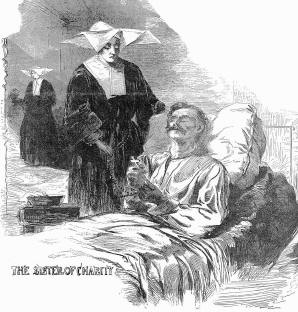 No one glancing at the simple headstone of Sister Matilda Coskery in St. Joseph's Cemetery in nearby Emmitsburg would ever guess her heroic role at Harpers Ferry, Winchester, Frederick, Antietam, Boonsboro, and Gettysburg. Nor would they think that she was born in Taneytown.
No one glancing at the simple headstone of Sister Matilda Coskery in St. Joseph's Cemetery in nearby Emmitsburg would ever guess her heroic role at Harpers Ferry, Winchester, Frederick, Antietam, Boonsboro, and Gettysburg. Nor would they think that she was born in Taneytown.
Anastasia Coskery joined the Catholic religious order, eventually known as the Daughters of Charity, in 1829 when nearly 30 years old and assumed the name, Sister Matilda. She was one of four Coskery children who devoted their lives to public service as doctors or members of religious communities. An essential part of the Daughters of Charity's
mission was providing nursing care and spiritual guidance to the sick, weak, and needy. Sister Matilda spent her next forty years fulfilling that mission. By the 1850s, she was recognized around the country for her work with the mentally ill. She helped found Mt. Hope Retreat, a hospital for people with a mental health condition that opened in Baltimore in 1840 and closed
in 1972. In addition, she authored a nursing textbook called Advices Concerning the Sick that was never published but gained respect throughout the medical community.
Sister Matilda was in her early sixties when the Civil War broke out. Her expertise until then had not been in the care of wounded patients, but she had had considerable experience training nurses and running nursing facilities. She and other members of her religious order responded to a call in June 1861 to care for Confederate soldiers stationed at
Harper's Ferry, WV. Sister Matilda detailed how the sisters traveled bravely to Harpers Ferry as they crossed "over the Potomac Bridge on which kegs of powder were already placed so that in the moment of the Enemy's approach, it might be destroyed."
A year after nursing Confederate patients, Sister Matilda and other nuns began working with Union doctors at General Hospital No. 1 in downtown Frederick, MD. The initial prejudice that the military personnel showed toward the nuns gradually turned into respect. Soldiers, on the other hand, always regarded their nurses as the "angels of the
battlefield." In September 1862, the nuns got a first-hand look at the aftermath of the Battle of Antietam when they spent six days caring for the wounded still lying on the battlefield in makeshift tents or crammed in nearby barns and farmhouses.
Emmitsburg, the American headquarters for the Daughters of Charity order, was located between two major battlegrounds of the war—Antietam, and Gettysburg. A large contingent of nuns rushed to Gettysburg immediately after that battle, just as they had responded to a call after Antietam. Sister Matilda was always one of the first to arrive on the
scene.
She spent her final years at the convent in Emmitsburg and died there in 1870. An admirer paid her the following tribute: "She was an eye to the blind, a staff to the lame, a precious balm to the wounded heart. She wept with those who wept and rejoiced with those who rejoiced."